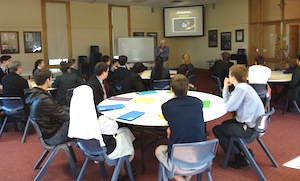
Human Rights are inscribed in the heart of people; they were there long before lawmakers drafted their proclamation. (Mary Robinson, former UN High Commissioner for Human Rights)
Through an invitation from Peter Clinch and Shane Wood who lead the ministries outreach of Oceania, I was privileged to present workshops on the vision and work of Edmund Rice International in Hobart, Melbourne, Sydney, Adelaide and Brisbane. Time prevented me from working with groups in other places in Oceania.
There was a readiness and enthusiasm by participants to truly join the dots through globalizing the local and localizing the global. The workshops explored the Rights-Based Approach (RBA) to advocacy and community development. The experience invited participants to think and respond differently when they see an injustice and are moved in their hearts to do something about it. Traditionally the response has been to identify ‘the need’ and to seek ways to address the situation through service, support and charity.
However if the first question asked is: ‘What rights are not being respected here?’ then the starting point is the naming of the inherent rights of those experiencing the injustice, and so an inquiry into the reasons for their not being able to enjoy their rights, begins.
Gradually the rights-holders (those being disregarded) are encouraged to find their voice and assert their inherent rights, challenging the duty-bearers (those who hold power) to change the structures so that the rights-holders can enjoy their God-given rights. This is the self-empowering path of advocacy that begins and ends with those who experience exclusion and marginalization finding agency, dignity and self-worth through coming to an understanding of their human rights, and claiming space in which to enact and enjoy them.
Edmund Rice international takes the stories of those who cry out for rights and justice to international agencies such as the Human Rights Council of the United Nations, who in turn brings pressure to bear on the duty bearers who hold the power to change the oppressive structures. These structures deny dignity, respect and the enjoyment of a full and fruitful life to those who are made poor through economic, social, cultural and political systems that are kept in place by those who are the beneficiaries of the systems.
Each of the workshops held in Adelaide, Sydney, Hobart, Melbourne and Brisbane gathered people of all ages who now feel the call address the inequities of our earth community, not only through service, but through posing the question:- ‘Why do we need to offer this service year after year?’ ‘What is the source of the problem?’ These are the questions that take one onthe path of advocacy that seeks to challenge the underlying causes of marginalization, poverty and exclusion.
Peter Harney